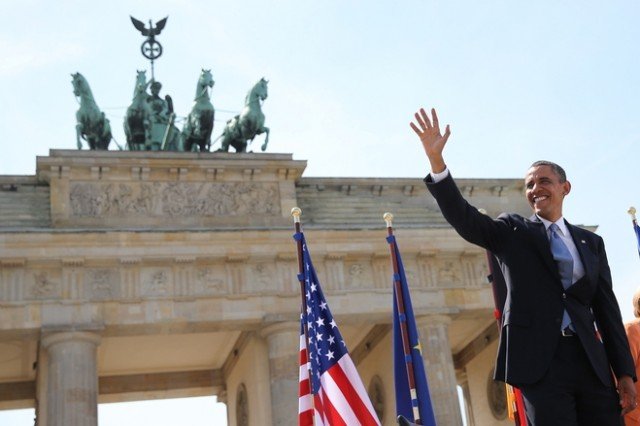Barack Obama speaking at Brandenburg Gate 50 years after JFK’s “Ich bin ein Berliner” speech
President Barack Obama has used his public speech in Berlin to propose cuts of one-third in American and Russian nuclear arsenals.
Speaking at the Brandenburg Gate, Barack Obama called for reductions in the number of tactical warheads deployed in Europe.
The US president also pledged to boost efforts to close the Guantanamo Bay detention centre and tackle climate change.
Earlier, Barack Obama met Chancellor Angela Merkel, who criticized the broad scope of US surveillance programmes.
This is Barack Obama’s first visit to Berlin as American president.
His address to students and government officials at the Brandenburg Gate, which once divided East and West Germany, comes almost 50 years after President John F. Kennedy’s celebrated “Ich bin ein Berliner” speech.
In a speech which centred on a theme of freedoms, Barack Obama said the gate was a symbol that “no wall can stand against the yearnings for justice… that burn in the human heart”.
“Today’s threats are not as stark as they were half a century ago, but the struggle for freedom and security and human dignity, that struggle goes on,” he said.
“We may no longer live in fear of global annihilation but so long as nuclear weapons exist, we are not truly safe,” calling for intensified efforts to limit their spread.
Barack Obama said he had determined that the US could ensure its own and its allies security and maintain a credible deterrent “while reducing our deployed strategic nuclear weapons by up to one third”.
“I intend to seek negotiated cuts with Russia to move beyond Cold War nuclear postures,” he said.
Under the New Start treaty which the US signed with Russia in 2010, each side is allowed a maximum of 1,550 warheads and no more than 700 deployed launchers.
The new limit on delivery systems is less than half the ceiling of 1,600 specified in the original Start treaty from 1991.
Barack Obama added that the US would also work alongside NATO allies to seek “bold reductions” in the use of tactical weapons in Europe, and would also seek to forge a new international framework for the use of peaceful nuclear power.
He said the US rejected the nuclearisation of countries like North Korea and Iran.
Shortly before Barack Obama spoke, Russian President Vladimir Putin was quoted as saying that Moscow “cannot allow the balance of the system of strategic deterrence to be disturbed or the effectiveness of our nuclear force to be decreased”.
A senior foreign policy adviser to Vladimir Putin said other nuclear-armed countries would have also have to reduce their stockpiles for such a plan to work.
“The situation now is not like in the 1960s and 1970s when only the United States and the Soviet Union held talks on reducing nuclear arms,” Yury Ushakov told a briefing in Moscow.
“Now we need to look more broadly… and increase the circle of participants in possible contacts on this matter.”
Barack Obama said that for the US, moving beyond the Cold War “mindset of perpetual war” also meant redoubling efforts to close the US prison camp at Guantanamo, tightly controlling the use of new technology like drones and “balancing the pursuit of security with the protection of privacy”.
In her morning meetings with Barack Obama, Chancellor Angela Merkel had criticized PRISM, the recently exposed US phone and internet surveillance programmes, saying: “We do see the need for gathering information, but there is a need for due diligence and proportionality.”
The chancellor grew up in Communist East Germany, where police surveillance was widespread.
Angela Merkel acknowledged that the internet “enables enemies of a free liberal order to use and abuse and bring threats to all of us”, but “an equitable balance must be struck”.
Barack Obama said the monitoring applied within narrow limits to do with national security. It had detected 50 potential threats and saved many lives, he emphasized.
“This is not a situation where we simply go into the internet and begin searching any way we want,” the US president told a news conference in Berlin.
Barack Obama’s visit comes after G8 leaders backed calls for holding Syrian peace talks in Geneva “as soon as possible”.
Speaking earlier, Barack Obama said the US was confident that the Syrian government had used chemical weapons during the 26-month-old conflict, but refused to spell out what aid might go the rebels.
“I cannot and will not comment on specifics on our programmes related to the Syrian opposition,” Barack Obama said, stressing his support for a political transition.
[youtube qryJNyDV81U]
[youtube XjHcNhcahv4]


